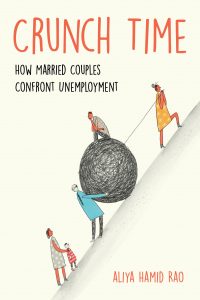In Crunch Time: How Married Couples Confront Unemployment, Aliya Hamid Rao offers a new addition to sociological research on unemployment, delving into the ways that gender beliefs unequally shape men’s and women’s experiences of job search and unemployment. Sarah Damaske recommends this wonderful and engagingly written book for introducing a much-needed gender and work-family lens to the unemployment literature.
If you are interested in this book review, you can read an interview with author Dr Aliya Hamid Rao on Crunch Time and the implications of its findings during the COVID-19 pandemic.
Crunch Time: How Married Couples Confront Unemployment. Aliya Hamid Rao. University of California Press. 2020.
 Find this book (affiliate link):
Find this book (affiliate link): ![]()
Aliya Hamid Rao’s Crunch Time: How Married Couples Confront Unemployment is a necessary addition to the sociological research on unemployment that has been surprisingly lacking in a gendered/work-family lens. Published in summer 2020, Crunch Time arrived in the middle of the COVID-19 pandemic, which further elevated the need for more sociological attention on the ways that gender beliefs unequally shape men’s and women’s job search and unemployment experiences.
There are many important contributions and insights in Crunch Time, including the ‘ideal job-seeker’ norm; whether one is ‘morally’ unemployed; men’s and women’s differential use of space in the home; the decision in some families to take a ‘pause’ on the economy of gratitude; and the ways women’s time is used to cut costs, while money is spent to preserve men’s time. Crunch Time is also engagingly written and accessible to a wide audience and would be great for use in both undergraduate and graduate classrooms.
Crunch Time begins with the story of the Barons, a family in which Todd, the primary earner and breadwinning dad, had lost his job and is now seen as not ‘morally’ unemployed by his wife, Kimmie. To be morally unemployed, we learn, would be to be more dedicated (in a devotional sort of way) to the job search. Rao next introduces us to the Brozeks, a family in which Lisa, the primary earner and breadwinning mum, had lost her job, but whose unemployment is not characterised as a problem to be solved or as a moral failing, but as an ‘opportunity’ to figure out what should come next.
Rao argues that time and again families ‘deploy gendered strategies’ in the wake of an involuntary job loss and unemployment experience. These strategies are deeply traditional, recalling the masculine breadwinner and feminine homemaker family structure (even in families that were not originally set up in such a way) as a way to re-affirm their social status, even as other aspects of their social status are lost.

Image Credit: Image by Niek Verlaan from Pixabay
Importantly, Rao argues that as the unemployed’s contact with the world of paid employment retreats, they begin to affirm their ‘devotion to work’ at home, through the fulfillment of the ‘ideal job-seeker’ norm. This norm has a number of characteristics that other research on the job search has similarly identified, including networking, devotion to the job search, large amounts of time spent searching, etc.
Rao shows how this devotion is demonstrated at home through interactions with one’s spouse. She also reveals that the rewards of this devotion are both professional, through the acquisition of a new job, and familial, via the direction of family resources to the job seeker, including time, space, money and emotions to allow them to find work. Rao’s re-framing of the unemployed’s job search as something that is, at its core, both physically and symbolically done at home is a critical insight. This framework helps us to understand why men and women have such different experiences of involuntary job loss, unemployment and the job search process.
One of the ways that Rao illuminates this framework is by examining the ways that men and women (don’t) take up space in their homes. There are many sections in the book that shed new light on our understanding of unemployment, gender and work-family and Rao’s interrogation of the unemployed’s use of space is one of my favourites. The ways that the families set up their homes to facilitate men’s job searches will likely ring true to anyone who has read the news about the stay-at-home orders this year and how households rearranged to accommodate work at home — a situation that often seemed to prioritise men’s paid labour over women’s. Post-pandemic readers will likely not be surprised to learn that Rao found the women carved out very little space for themselves, nor did their families attempt to do so.
The section focused on gendered time in job searching draws out many important ways that women’s time is minimised while men’s time is prioritised. Rao’s discussion of how an egalitarian couple worked to prioritise the husband’s return to work (and how this meant the wife became a ‘helpmeet’ for her husband) is fascinating, as is the discussion of how a couple decided to ‘pause’ on the economy of gratitude, which I thought was an excellent extension of Arlie Russell Hochschild’s original insight. These portraits add to our understanding of how couples can be both mostly egalitarian and also still stigmatise men’s unemployment in a way that makes the couple more traditional during the unemployment period.
Rao concludes by showing us how these gender dynamics play out in the decision-making surrounding household labour during the unemployment period. Women do much more household and childcare labour and men do much less (they, at best, ‘help’). Rao does an excellent job of painting a portrait of how this happens in families (even in families where women seek to avoid this labour). I also thought that Rao’s insight into how women’s time is used to save the family money (primarily via household labour), while the family spends money to place value on the husband’s time, was an important one.
I do have some questions for future thought. I would have appreciated a bit more discussion about the length of unemployment, as it appears that most of the participants were among the long-term unemployed at the time of the first interview (and it appears from Tables 3 and 4 that, on average, the women had been out of work longer than the men). We know that long-term unemployment is quite a different experience than unemployment experiences that are less than six months long. We know less about whether the gendered dynamics change over time during the unemployment process, although my own recent research suggests that it does. Does the tolerance for unemployment further change/look different if it’s a woman’s or a man’s family who is judging the process? We could expect that it does, as research suggests that men continue to identify as workers even after long periods of unemployment, while research on unemployed women has found that they may retreat into their identities as mothers to protect them from the stigma of unemployment.
I also wanted to know a bit more about the severances and unemployment benefits of the unemployed and how these fit into the families’ overall ability to weather the financial storm they were experiencing. The families are, as Rao describes them, the ‘professional middle-class’ (they are quite elite in many ways with the vast majority of the women holding graduate degrees and the median household income over $150,000). All families were dual-earner and had savings, but I wondered whether severances or unemployment benefits (and their duration or end date) shaped the discussions Rao witnessed at all. Finally, I very much appreciated Rao’s discussion of the ‘morally’ unemployed and would have loved to see this concept brought into dialogue with Jennifer Sherman’s conception of how morality matters among the rural poor and their use of unemployment or welfare.
In sum, this is a wonderful book that introduces a much-needed gender and work-family lens to the unemployment literature. I expect it will appeal to scholars of gender, work and family. I also believe the book will be appealing to undergraduates and I look forward to teaching it in my undergraduate and graduate classrooms.
- This review first appeared at LSE Review of Books.
Please read our comments policy before commenting.
Note: This article gives the views of the author, and not the position of USAPP – American Politics and Policy, nor of the London School of Economics.
Shortened URL for this post: https://bit.ly/3vwTiWA
About the reviewer
Sarah Damaske – Pennsylvania State University
Sarah Damaske is an associate professor of sociology and labour and employment relations at Pennsylvania State University. Her books include The Tolls of Uncertainty, For the Family and The Science and Art of Interviewing, and her work has been featured in such venues as the New York Times, the Wall Street Journal and the BBC.



